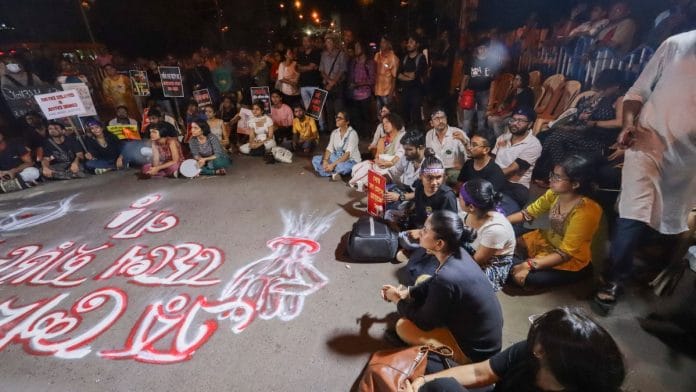Thank you dear subscribers, we are overwhelmed with your response.
Your Turn is a unique section from ThePrint featuring points of view from its subscribers. If you are a subscriber, have a point of view, please send it to us. If not, do subscribe here: https://theprint.in/subscribe/
Despite the respect traditionally held for the judiciary, there is growing outrage and dismay over the mishandling of the RG Kar rape and murder case, a heinous act that has shaken the nation. The Supreme Court proceedings on September 9th have deepened fears that justice is being delayed, manipulated, and compromised. What should have been a determined pursuit of accountability has been tainted by whispers of complicity, raising urgent questions about the state of our democracy and the future of justice in this country.
The case is being handled with reckless disregard, turning into a farcical legal spectacle designed to distract rather than confront the grim reality of the crime. For over a month, the streets of Kolkata have been filled with protesters demanding justice. Yet, those responsible for delivering justice appear more focused on delaying proceedings and maintaining a facade of order than addressing the seriousness of the crime.
This troubling entanglement between the judiciary, federal, and state authorities has become a glaring symbol of the widespread decay in governance. The institutions meant to protect citizens now seem to work together to protect the powerful. The independence of the judiciary, executive, and legislature, once sacrosanct, has eroded. What we are witnessing is not just a failure of justice but the erosion of the democratic principles upon which the nation was built.
Here lies a disturbing comparison between a banana republic and a democracy. In a banana republic, corruption is laid bare for all to see, and the villains are out in the open. In a democracy like ours, where institutions maintain a facade of legitimacy, the true perpetrators of injustice remain hidden behind a veil of legality. The illusion of fairness cloaks a system that serves the powerful rather than the people. This manipulation of power has made a mockery of our judicial system, exposing the federal structure meant to balance power as compromised by collusion between state and central governments.
The state government, which should stand with the victim’s family, appears more invested in shielding those in power. To compound the situation, we hear the state’s head urging people to prepare for Durga Puja celebrations. But what exactly are we celebrating in a time of collective grief? Mother Durga, the embodiment of power and protection, represents the destruction of evil. Are we honoring her by seeking justice and eradicating corruption, or are we preparing for a festival designed to distract from the injustice in our midst?
This crime is about more than the horrific murder of a 31-year-old woman; it symbolizes the systematic abuse of trust and the betrayal of the people’s faith in democracy, justice, and governance. The justice system has been weaponized, not to serve the common good, but to protect a select few. This is not merely incompetence on the part of the state government—it is something far more nefarious. The populism that dominates political discourse has devolved into high-handedness and indifference to the lives of ordinary citizens.
The RG Kar case stands as a painful reminder of how far we have fallen as a nation. The government, by the people and for the people, has been hijacked by elites who manipulate the state for their own ends. The media, often complicit, downplays atrocities or diverts attention, while citizens are left to fend for themselves. How many more cases like this must occur before we recognize the depth of systemic corruption?
The heinousness of the crime, the cover-up that followed, and the indifference of both legal and political systems are a sacrilege against the democratic norms that underpin our constitution. We pride ourselves on being the world’s largest democracy, but at this moment, we are a democracy in form, not in substance. The true villains of this story are not just the criminals who committed the act but the system itself, which allows such injustices to be shielded from scrutiny.
This is not just a plea for justice in one case; it is a plea for the survival of democracy itself. Each delay in justice further erodes the people’s faith in the system, bringing us closer to chaos. We are at a crossroads, and the decisions made in the coming days will determine whether we are a democracy worth saving or a failed state sliding into authoritarianism.
As we approach the one-month mark since this horrific crime, the legal and political systems must act decisively. Every moment of delay denies justice to the victim and her family and strikes at the heart of our democracy. The people are watching intently, and history will judge what is done next. The time for action is now. The future of justice in this nation depends on it, and we can no longer afford to be silent.
These pieces are being published as they have been received – they have not been edited/fact-checked by ThePrint


